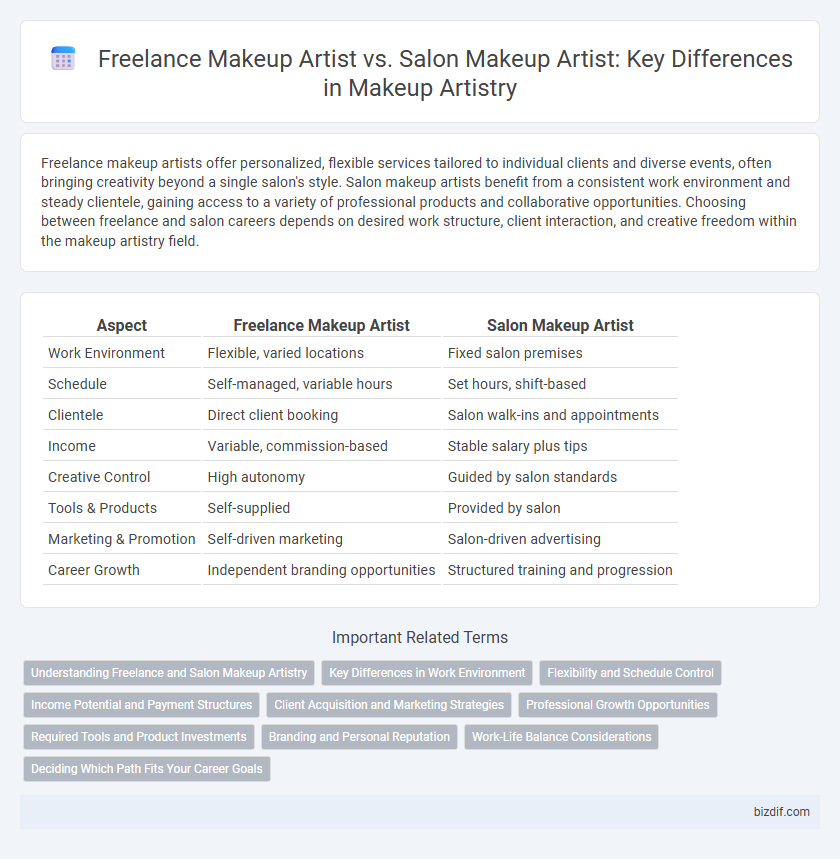Freelance makeup artists offer personalized, flexible services tailored to individual clients and diverse events, often bringing creativity beyond a single salon's style. Salon makeup artists benefit from a consistent work environment and steady clientele, gaining access to a variety of professional products and collaborative opportunities. Choosing between freelance and salon careers depends on desired work structure, client interaction, and creative freedom within the makeup artistry field.
Table of Comparison
| Aspect | Freelance Makeup Artist | Salon Makeup Artist |
|---|---|---|
| Work Environment | Flexible, varied locations | Fixed salon premises |
| Schedule | Self-managed, variable hours | Set hours, shift-based |
| Clientele | Direct client booking | Salon walk-ins and appointments |
| Income | Variable, commission-based | Stable salary plus tips |
| Creative Control | High autonomy | Guided by salon standards |
| Tools & Products | Self-supplied | Provided by salon |
| Marketing & Promotion | Self-driven marketing | Salon-driven advertising |
| Career Growth | Independent branding opportunities | Structured training and progression |
Understanding Freelance and Salon Makeup Artistry
Freelance makeup artists offer personalized services with flexible scheduling, often catering to diverse client needs and special events, enhancing their portfolio through varied experiences. Salon makeup artists work within established beauty salons, providing consistent services within a structured environment, benefiting from client referrals and professional product access. Both roles require strong makeup artistry skills, but freelance artists must excel in self-promotion and client management, whereas salon artists rely on salon reputation and teamwork.
Key Differences in Work Environment
Freelance makeup artists enjoy the flexibility of working in diverse settings such as client homes, photoshoots, and events, allowing personalized schedules and creative freedom. Salon makeup artists operate within structured environments, benefiting from stable workflows, access to professional equipment, and direct client referrals. Both roles demand strong interpersonal skills, but freelancing requires business management expertise, while salon artists often rely on team collaboration.
Flexibility and Schedule Control
Freelance makeup artists enjoy greater flexibility, allowing them to choose clients, set their own hours, and adapt their schedules to personal commitments. Salon makeup artists typically follow fixed shifts within the salon's operating hours, limiting their control over daily timetables. This autonomy makes freelancing ideal for professionals seeking work-life balance and varied project opportunities.
Income Potential and Payment Structures
Freelance makeup artists often experience variable income potential, relying on client bookings, event frequency, and personal marketing efforts, with payments typically made per job or through deposits. Salon makeup artists usually receive a stable, fixed salary or hourly wage, sometimes complemented by commissions or tips, providing consistent monthly earnings but limited by salon policies. The freelance model offers higher earning ceiling due to diverse gigs and premium rates, while salon positions guarantee financial stability with less income fluctuation.
Client Acquisition and Marketing Strategies
Freelance makeup artists leverage social media platforms such as Instagram and TikTok to showcase portfolios and engage directly with potential clients, utilizing influencer collaborations and content marketing to expand reach. Salon makeup artists benefit from established client bases through in-house scheduling systems and often rely on salon promotions and referral programs to maintain steady appointments. Both roles require targeted digital marketing strategies, but freelancers must invest more in personal branding and online visibility to compete effectively in client acquisition.
Professional Growth Opportunities
Freelance makeup artists experience diverse professional growth opportunities by working with varying clients, brands, and projects, which enhances their adaptability and portfolio. Salon makeup artists benefit from structured career paths, consistent training programs, and mentorship that support skill refinement and steady advancement. Both career paths offer unique avenues for expanding expertise and establishing a strong professional reputation within the beauty industry.
Required Tools and Product Investments
Freelance makeup artists typically invest in a diverse range of portable, high-quality products and tools to accommodate various client preferences and on-location demands, including professional brushes, palettes, and skin-safe adhesives. Salon makeup artists often utilize salon-provided standardized tools and products, focusing their investment on personal items and specialty products that complement the salon's existing inventory. Both roles require continuous investment in current industry brands, dermatologically tested products, and hygiene tools to ensure client safety and satisfaction.
Branding and Personal Reputation
Freelance makeup artists build their branding and personal reputation through direct client interactions, social media presence, and a diverse portfolio showcasing versatility and creativity. Salon makeup artists benefit from the established reputation of the salon, gaining trust through its brand but facing limitations in personal brand autonomy. Effective branding for freelancers relies heavily on self-promotion and networking, whereas salon artists often leverage the collective reputation of their workplace to attract clients.
Work-Life Balance Considerations
Freelance makeup artists often enjoy greater flexibility in scheduling, allowing personalized control over work-life balance by choosing clients and working hours. Salon makeup artists typically follow fixed shifts, which can lead to a more structured but less adaptable routine, impacting personal time and stress levels. Understanding these differences helps professionals align their career path with desired lifestyle and time management preferences.
Deciding Which Path Fits Your Career Goals
Freelance makeup artists benefit from flexible schedules and diverse client opportunities, allowing growth in varied niches such as bridal or fashion makeup, while salon makeup artists enjoy steady income, professional support, and established clientele. Choosing between freelance and salon paths depends on prioritizing independence versus stability, as well as the preferred work environment and networking style. Evaluating personal career goals, income expectations, and desired work-life balance helps makeup artists decide which path aligns best with their professional aspirations.
Freelance makeup artist vs Salon makeup artist Infographic

 bizdif.com
bizdif.com